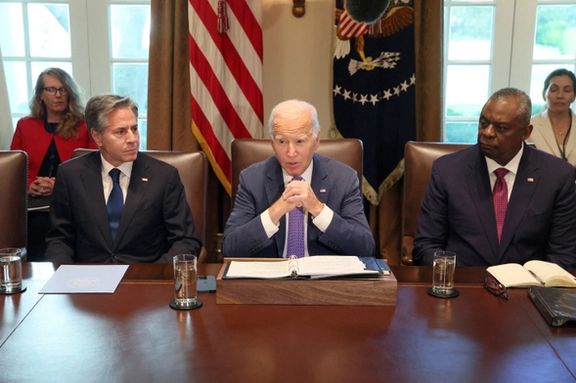The Moral Clarity Test Biden Failed: Condolences for Iran's 'Butcher'

The death of Iranian President Ebrahim Raisi on May 19 presented a moment of moral clarity for President Joe Biden, and he failed this test.

The death of Iranian President Ebrahim Raisi on May 19 presented a moment of moral clarity for President Joe Biden, and he failed this test.
This incident has brought to light the profoundly insensitive reactions from Western leaders, particularly the United States. The Biden administration's rush to express condolences for the death of Raisi—an individual known as the "Butcher of Tehran" for his role in the mass execution of over 4,000 political prisoners in the 1980s—was deeply traumatic and insulting to Iranians.
In a surprising and unprecedented move, the US State Department issued an official statement expressing condolences for the deaths of Raisi, Foreign Minister Amir-Abdollahian, and other members of their delegation in a helicopter crash in northwest Iran. At the United Nations, US Deputy Ambassador Robert Wood was seen standing during a moment of silence held for Raisi, further adding to the distress.
National Security Council spokesperson John Kirby attempted to justify the administration’s response, describing it as a "typical practice" following the death of a world leader. This defense, however, prompts a critical question: Would the United States feel obliged to offer similar condolences for the deaths of notorious figures like Bashar al-Assad or Vladimir Putin? In the past, the U.S. has refrained from such gestures towards leaders like Saddam Hussein, Muammar Gaddafi, or even Hugo Chavez, who were also responsible for egregious human rights violations.
Even in a similar case concerning Iran, when Ruhollah Khomeini, the leader of the Islamic Revolution, passed away, the White House did not directly offer condolences. Instead, it expressed hope that "With his passing, Iran would now move toward assuming a responsible role in the international community."
Upon the death of Kim Jong Il in 2011, the White House did not offer condolences but reaffirmed its "commitment to stability on the Korean peninsula, and to the freedom and security of our allies." While there are instances where the US did offer condolences, such as in the case of Hafez Assad in 2000, the practice of offering condolences is selective and far from typical. The response largely depends on the complexity of the relationship and the diplomatic agenda of the US. However, the issue with Iran is even more complicated. Unlike other cases, there is no formal relationship between the two countries, and more importantly, the Islamic Republic considers America the great Satan, actively chants "Death to America," and threatens American interests.
Perhaps a more significant difference is that at the time of Raisi's death, there has been an active democracy-seeking movement in Iran for at least six years, and an ongoing conflict between the Iranian people and the regime, which was not the case in other scenarios. Therefore, this inconsistency and selective sympathy reveal a troubling moral lapse, an inability to clearly distinguish between good and evil, and a strategy of appeasement designed to curry favor with the Iranian regime for future diplomatic negotiations. The recent meeting of American officials with the regime in Oman only adds to these suspicions.
Even more shocking was the prayer offered by Senate Chaplain Barry Black for "the people of Iran who are mourning the death of Raisi," implying that the Iranian public grieves for a leader who spent 40 years issuing death sentences and suppressing dissent. This comes after videos circulating on social media showed Iranians bravely celebrating with fireworks, passing out sweets, and sharing pictures of themselves toasting drinks or dancing. In response to the wave of celebrations, Mohammad Movahedi Azad, the regime’s Attorney General, issued a directive threatening social media users with "swift, effective, and deterrent action."
Such messages are not only tone-deaf but also demonstrate a profound ignorance of the political realities in Iran and the aspirations of its people. The Biden administration’s reaction represents a severe moral backslide compared to that of his peers in the Democratic Party. When Pol Pot, the leader of the Khmer Rouge, died, President Bill Clinton not only refrained from expressing condolences but also used the occasion to call for justice for the victims and accountability for his accomplices.
For the past six years, Iranians have repeatedly taken to the streets, most notably in November 2019, which led to the deaths of 1,500 protesters, and during the nationwide uprising of 2022 known as the Woman, Life, Freedom movement, crying for freedom. Brave Iranian women have challenged a regime that has even worn-down great powers. The memory of Nika Shakarami, a 16-year-old protester who fought for her life, or Majidreza Rahnavard, who was hanged from a crane, should have reminded Western leaders to honor these struggles rather than sympathize with their oppressors.
This episode is especially demoralizing for President Biden, who rhetorically promised to bring human rights back to the forefront of US foreign policy and to restore America's global leadership. Instead, his administration's actions have further traumatized the oppressed Iranian society. The Biden administration’s response to Raisi's death reflects a profound moral failure and a disregard for the suffering of the Iranian people. The West must recognize the aspirations of those fighting for freedom and refrain from actions that inadvertently legitimize their oppressors.